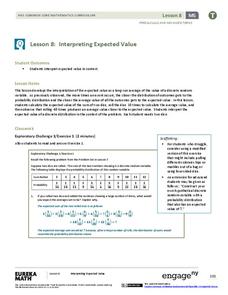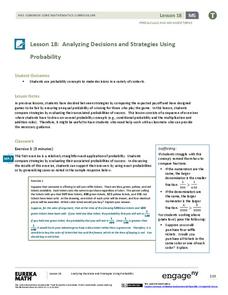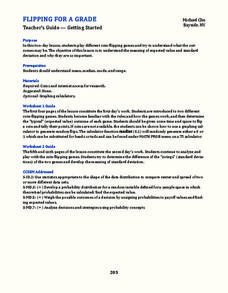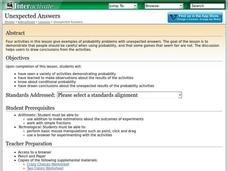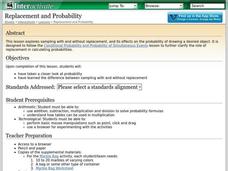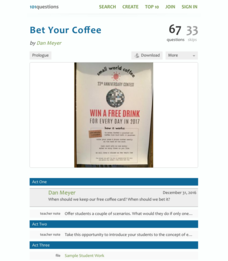EngageNY
Interpreting Expected Value
Investigate expected value as a long-run average. The eighth installment of a 21-part module has scholars rolling pairs of dice to determine the average sum. They find aggregate data by working in groups and interpret expected value as...
EngageNY
Using Expected Values to Compare Strategies
Discover how mathematics can be useful in comparing strategies. Scholars develop probability distributions for situations and calculate expected value. They use their results to identify the best strategy for the situation.
EngageNY
Expected Value of a Discrete Random Variable
Discover how to calculate the expected value of a random variable. In the seventh installment of a 21-part module, young mathematicians develop the formula for expected value. They connect this concept the dot product of vectors.
EngageNY
Games of Chance and Expected Value 2
Use expected values to analyze games of chance. The 15th installment of a 21-part module has young mathematicians looking at different games involving tickets and deciding which would be the best to play. They calculate expected payoffs...
EngageNY
Analyzing Decisions and Strategies Using Probability 1
Learn how to increase the probability of success. The 19th installment of a 21-part module teaches future mathematicians how to use probability to analyze decisions. They determine strategies to maximize the chances of a desired outcome.
Curated OER
Probability and Expected Value
Students collect data and analyze it. In this statistics lesson, students make predictions using different outcomes of trials.
Curated OER
Probability and Applications of Simulations
Middle schoolers apply properties of probability to the real world. In this probability lesson, learners simulate the construction of empirical distribution. They collect and analyze data using central tendencies.
University of Nottingham
Modeling Conditional Probabilities: 2
Bring the concept of conditional probability alive by allowing your classes to explore different probability scenarios. Many tasks have multiple solutions that encourage students to continue exploring their problems even after a solution...
Curated OER
Flipping for a Grade
What happens when your teachers get tired of grading tests and want to use games of chance to determine your grade? How would you decide which game they should play? Learn how to use expected value and standard notation to compare two...
Curated OER
Expected Outcome
Young scholars determine expected values of experiments and explore distributions of experiments. They guess as to how many times a coin will flip heads in fifty tries. They flip a coin fifty times graphing the results on a histogram....
101 Questions
Money Duck
A video presentation shows duck-shaped soap that has a $1, $5, $10, $20, or $50 bill in its center. Learners consider different population distribution of the bills to determine a reasonable price for the duck.
Curated OER
Unexpected Answers
Students explore the concept of fairness. In this fairness lesson, students play four probability games. Students determine who has the best chance of winning each of the four games. Students discuss which games gave an unfair advantage.
Google
The Law of Large Numbers and Probability
Learners investigate why theoretical probability doesn't always match reality. The activity involves using Python 2.7 (or Sage) to set up a Bernoulli Trial. It also involves setting up a spreadsheet to simulate the Birthday Paradox....
Curated OER
Observing M&M Colors: A Multinomial Experiment
Students use hands-on activities to study statistics. They review the chi-square distribution and expected value. Activities involve discovering calculation a hypothesis, frequency distribution, and probability.
Curated OER
Fire!, Probability, and Chaos
Students explore the concept of probability. In this probability lesson, students simulate a controlled forest burn using an applet. Students vary the probability of trees burning and predict what will happen.
Shodor Education Foundation
Replacement and Probability
Middle and high schoolers explore the concept of probability. In this probability lesson, learners conduct an experiment with a bag of marbles. Pupils draw marbles from a bag and determine the probability of drawing a particular color...
Curated OER
Gems in the Market Today
A gem of a instructional activity! Analyze what makes stones valuable and their aesthetic value. Young gemologists use the Internet to choose what stone they are interested in and then write an advertisement.
Curated OER
Fred's Fun Factory
Round and round and round she goes. Where she stops, nobody knows. This activity uses a common arcade game of chance, the spinning wheel, as a platform for computing expected values, interpreting results, and applying this knowledge to...
EngageNY
Making Fair Decisions
Life's not fair, but decisions can be. The 17th installment of a 21-part module teaches learners about fair decisions. They use simulations to develop strategies to make fair decisions.
101 Questions
Bet Your Coffee
Coffee drinkers, rejoice, here's a chance to win free coffee! Coffee club card holders have the chance to win free coffee every day for a year—but they must enter using their cards good for a free cup. Scholars weigh the chances of...
Curated OER
Probability Distributions
Students collect and plot data on a graph. In this statistics lesson plan, students analyze the distribution of a sample and predict the outcome. They find the line of best fit and discuss what would make the sample larger.
EngageNY
Margin of Error When Estimating a Population Mean (part 1)
We know that sample data varies — it's time to quantify that variability! After calculating a sample mean, pupils calculate the margin of error. They repeat the process with a greater number of sample means and compare the results.
EngageNY
Fair Games
What constitutes a fair game? Scholars learn about fair games and analyze some to see if they are fair. They extend this idea to warranties and other contexts.
Curated OER
Identity: A Path to Self-Esteem
Sixth graders participate in a brainstorming activity in which they identify the types of decisions they make everyday. Individually, they complete a worksheet on making decisions effectively. After reading a poem, they identify the...
